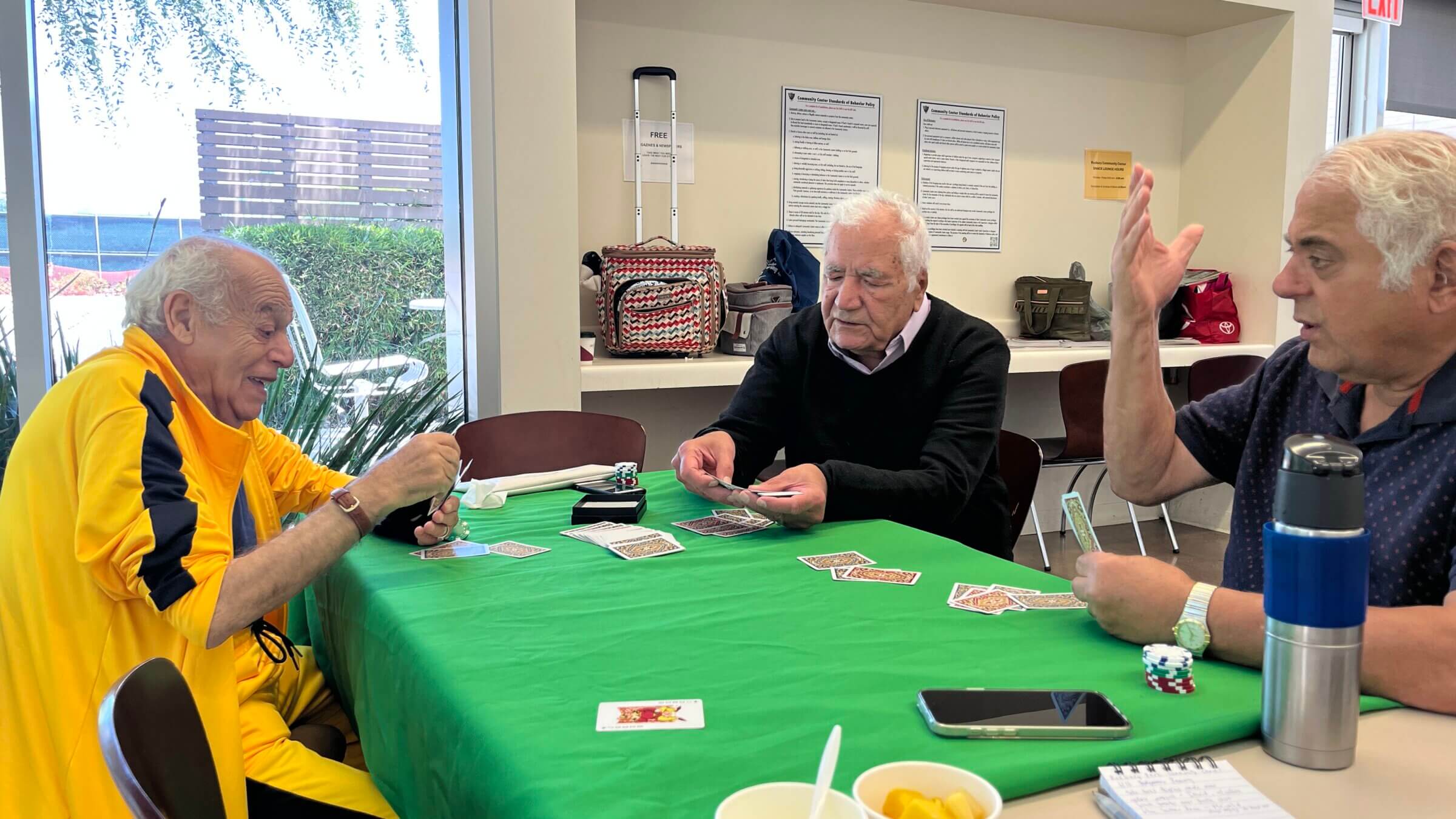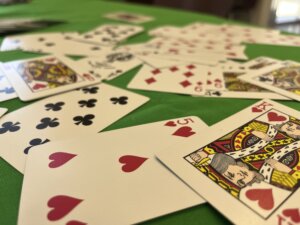At an Iranian Jewish hangout, retirees wonder if regime change is in the cards
Over backgammon and rummy, Iranian expats dream of Israel defeating the regime that drove them out of their homeland

Left to right: David, Mehjad and Menashe each fled Iran more than 30 years ago. Photo by Louis Keene
LOS ANGELES – Thousands of miles away and decades removed from his country of birth, the man in the yellow tracksuit frowned over his cards. “Bi’ah,” David said in his native Farsi, discarding one. The word usually translates to “come,” but he was talking to his opponent: Go.
David, who is 79 and declined to share his last name, plays rummy and backgammon most afternoons with other Iranian Jewish retirees in this air-conditioned community center on L.A.’s Westside. They take its safety and comfort for granted as war rages in the country they fled.
The last few days had been exhilarating for David. On Thursday, Israel launched an attack against Tehran — his hometown — killing several leaders of the country’s military and its nuclear program in a matter of hours. Over the weekend, his old apartment building in Bat Yam, a Tel Aviv suburb, was destroyed by retaliatory Iranian missile fire.
“I talked to someone [in Iran] today. They are happy.”MenasheJewish Iranian expat
He was bullish on the war in spite of the losses. “Israel is going to get them,” David said, pounding his fist in the air. He predicted the entire campaign would take two weeks. “Baruch Hashem,” he said.
The man across from him, Menashe, picked up a card from the discard pile. “Every other country in the Middle East wanted this to happen,” Menashe, 75, said.
They are among the legions of Jews who fled Iran in the 1980s and 1990s after Ayatollah Ruhollah Khomeini came to power in the 1979 Islamic Revolution. Many of them eventually settled in Los Angeles, where anywhere between 22,500 to 50,000 Jews help constitute what today is the largest Iranian community outside Iran. And though both Menashe and David still have family in Iran, they were not ambivalent about the bombing.
“I talked to someone there today,” said Menashe, referring to Iran. “They are happy.”
Their optimism reflected what appears to be a consensus supporting the war among former Iranian refugees. Many see Israel’s attack — characterized by Israeli Prime Minister Benjamin Netanyahu as a preemptive assault — as a necessary step to curtail Iran’s development of nuclear weapons. Perhaps regime change — and a path toward liberalism — was in the cards, too.
Sam Yebri, an Iranian-Jewish attorney who lives in Los Angeles, said Monday that the war had the potential to produce a “‘fall of Berlin Wall’ type of moment.”

The nonprofit Yebri founded to celebrate Iranian-Jewish culture is named 30 Years After, honoring a generation of immigrants like David and Menashe, who gave up everything they had in Iran to pursue freedom elsewhere.
Before David emigrated from Iran in the mid-1980s, he had owned a thriving women’s clothing wholesaler, importing precious fabrics from Italy and Morocco. He left behind a $20 million fortune when he fled, he told me; it was easier to immigrate to Israel than the United States, and he started over in Bat Yam.
Six years later, he moved again to the U.S., where he built a new fashion empire, and a family: three daughters, a son and five grandchildren, he cheerfully reported.
Israel’s willingness to take in those fleeing the Ayatollah informs their descendants’ deference to the country today, according to Rachel Sumekh, an Iranian American Jewish nonprofit leader. Moreover, she said, Jewish expats had lingering resentment toward everyday Iranians for failing to protect them after the Islamist government took control.
Sumekh, whose mother fled to Israel in the mid-1980s, believed Israel’s claims that Iran was on the verge of nuclear armament. Yet she remained skeptical of the war. An estimated 5,000 to 10,000 Jews still live in Iran today, she said, and they were the most vulnerable in the current moment. “If this war is to save Jews, what about the Jews in Iran?” she said.
“I want both places,” Sumekh added, referring to Iran and Israel, “to be places that I can visit with a sense of peace and safety, and I want everyone who lives in those places to feel peace and safety. I just believe that peace and diplomacy is the way we get there. I don’t trust bombs.”
















